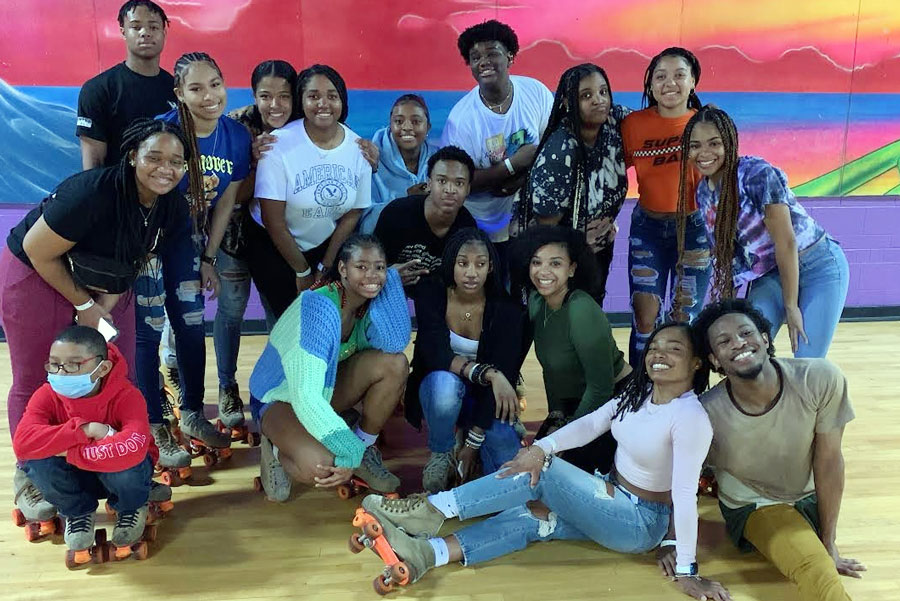Women of color react to Supreme Court confirmation
Black Student Union moderator notes historic significance
Members of Black Student Union gather for a day of fellowship with Black affinity groups at nearby schools, celebrating African-American culture here on the Hill. The BSU faculty moderator and several officers noted the historical significance of Ketanji Brown Jackson becoming the first Black female on the United States Supreme Court.
After her historic nomination and confirmation, Judge Ketanji Brown Jackson will be the first Black woman to serve on the United States Supreme Court.
According to the voices of leaders within the Black Student Union paired alongside the Hill’s social studies teachers, these everlasting questions over race, gender, justice and equality have many complex facets and mirror parallel issues facing the campus today.
According to BSU officer junior Kahmara Munn as well as Mrs. Jean Smith, BSU co-moderator and director of philanthropic engagement, a lot of these issues have fallen into the ready and willing hands of the Black Student Union. “I think one of the most important things about the BSU,” Smith said, “is that we’re not only trying to share Black culture with the school but we’re also affirming one another.”
This education and affirmation started with small yet meaningful acts like sharing a Black history moment every day over announcements during Black History Month. As Smith explained, it also meant a day of fellowship with similar affinity groups from other private high schools in the area such as Brebeuf Jesuit and Park Tudor.
Adding to this, the BSU has also been pushing for real and sweeping change in recent days.
“In the Blue Book, beads and (added) hair color are contraband. We wear beads, that’s part of our culture.” Munn said. She and BSU leadership have been pushing for an amendment to the book eliminating the rule that she believes disproportionately affects the Black community here on the Hill.
“For the new incoming freshmen, I don’t want them to look at the Blue Book and think ‘Oh, I can’t wear my head wrap’ or ‘Oh, I can’t wear my beads’ because it’s contraband so I don’t want to go here anymore.” In addition to a push for more leeway in cultural outerwear, the BSU has also been putting in the work to spread the history through its annual leadership of Black History Month festivities. “February is very busy,” Smith said with a laugh.
Following current events, there will undoubtedly be much more history to spread soon.
Government teacher Mr. Craig Blanchet explained that Judge Jackson has had an illustrious and well-rounded career. She graduated near the top of her class at Harvard — where she edited the law review — and later went on to serve indigent defendants, according to Blanchet. Someone who’s seen the most well off and the downest on luck, Jackson “should bring a perspective to the bench that includes everyone on the economic spectrum,” he said.
Blanchet also cited the fact that she once clerked for retiring Supreme Court Justice Stephen Breyer. “I wouldn’t underestimate her time as a clerk,” he said. “That really gives her a flavor of what it’s like to serve at those high courts.”
However, according to U.S. History teacher Sister Mary Ann Stewart, the ideological balance on the court will likely sway very little with her nomination. “She’s replacing Judge Stephen Breyer, and they’re both liberals, so really not much will change,” she said. “She’ll step into his position and represent his viewpoints, but at this point (the left leaning justices) are outnumbered.”
Women of color have noted the historical significance of the nomination and confirmation.
“As a Black woman, and as a woman in general, it is amazing to me seeing the first African-American female Supreme Court justice,” Smith said. “This is very powerful for young girls, for young Black girls, and really for our country to see how we are evolving more and how the court is slowly but surely looking more reflective of the people for which it serves.”
Munn called Jackson’s selection “motivation for younger generations.”
BSU officer sophomore Taylor Jones seems to agree, calling the whole event “a step in the right direction,” adding that “if she can do it, I can do it.”
Blanchet noted that in addition to the historical and racial significance of Jackson’s new role, she is also qualified by her own merit alone, through her career and education. “I don’t think, from an academic perspective, there were many holes to punch,” he said, saying her depth of experience could be what he called “a positive for the court.”
The opposition has largely criticized past rulings and the unusual circumstances around her nomination. But three Republicans did join the 50 Democratic Senators on April 8 in voting for Brown Jackson’s confirmation.
“There (was a) debate about whether she has been strict enough in her rulings having to do with child abuse,” Stewart said. Some opponents have accused her of delivering unusually light sentences for child pornographers and similar criminals.
Blanchet, who earned a law degree from Indiana University, also touched on the concept of affirmative action, an issue his classes have been discussing about whether electing someone largely by virtue of their race does “more of a service or disservice” to the Court, the country and minority groups. He also added that an important component Jackson will be continually scrutinized over is whether she’s going to be more of a textualist, “holding true to past decisions,” or more of an internationalist, who shapes rulings “to fit society” and its needs.
Regardless, Brown’s confirmation will be a supremely significant moment in this nation’s history, but to many, this is merely the beginning. “I really appreciate the groundwork that folks like Judge Jackson and others are setting for minority women and for women in general. They might be the first, but not the last,” Smith said. “I look forward to the day we are no longer talking about the first African-American this or that.”
For Munn, this nomination is proof of the American dream in action. “We can be a President, we can be a judge. We can be a police officer.”
For Smith, change like this doesn’t have to be on the world stage. It can all start right here on the Hill through impactful affinity groups such as BSU, Asian Student Union, Latin Student Union and myriad others. “It’s really cool that we are in a space like Cathedral where we can celebrate our own identities,” she said.








